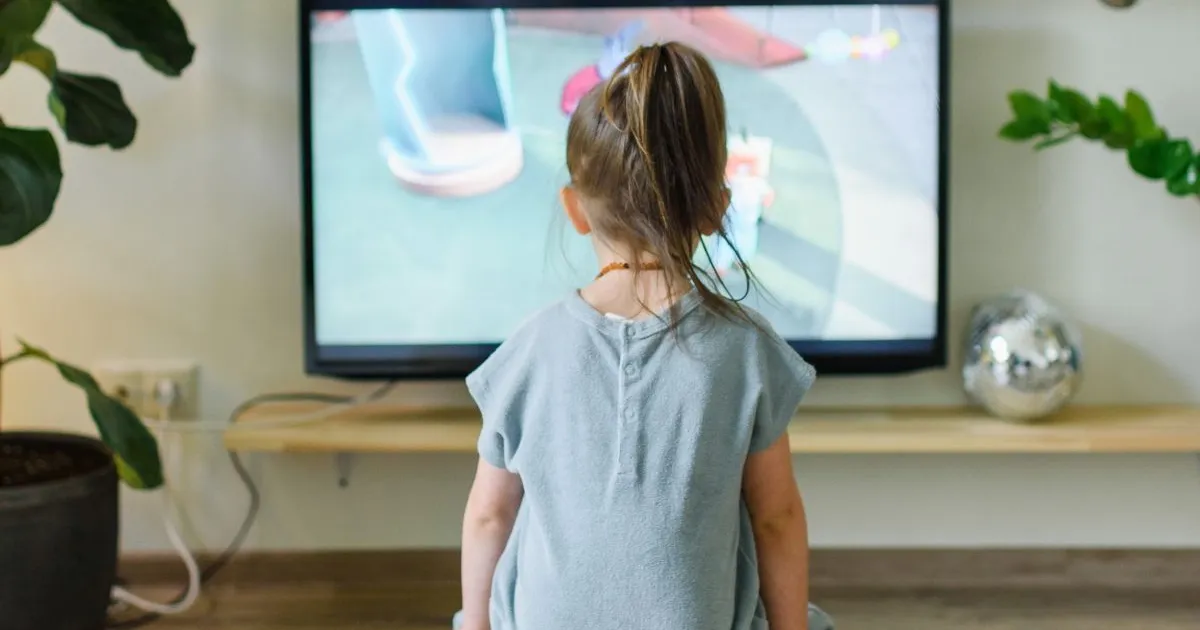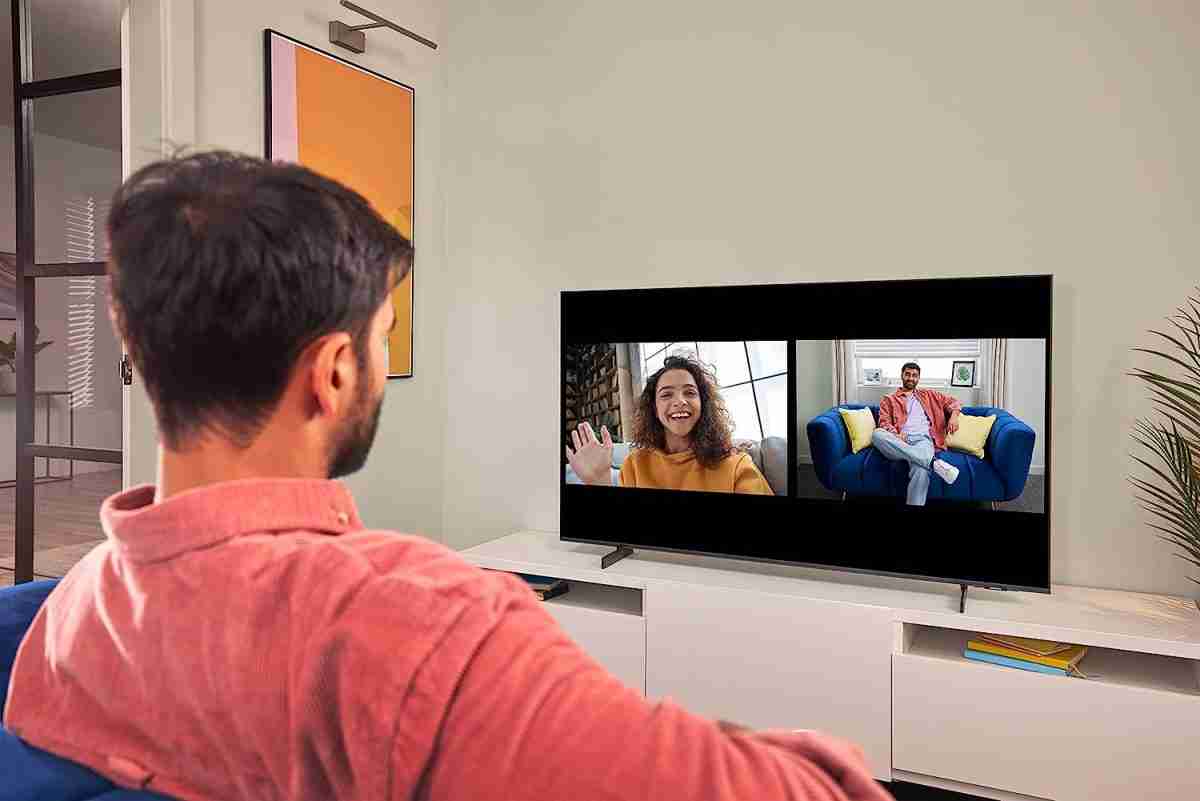Home>Technology>Home Entertainment Systems>Why Is Television Bad?


Home Entertainment Systems
Why Is Television Bad?
Published: December 20, 2023
Discover why home entertainment systems, specifically television, can be detrimental to your health and well-being. Explore the negative impacts of excessive screen time and find ways to strike a healthy balance.
(Many of the links in this article redirect to a specific reviewed product. Your purchase of these products through affiliate links helps to generate commission for Storables.com, at no extra cost. Learn more)
Introduction
Television has become an integral part of modern daily life, providing endless hours of entertainment and information for millions of households worldwide. However, despite its popularity, there is a growing concern about the negative effects that television can have on various aspects of our lives. In this article, we will explore some of the reasons why television can be bad for us and the potential consequences it can have on our health, cognitive development, social skills, physical activity, sleep patterns, academic performance, relationships, productivity, and emotional well-being. Understanding these potential drawbacks is essential for making informed decisions about our television consumption and finding a healthy balance in today’s digital age.
Key Takeaways:
- Excessive television viewing can lead to weight gain, disrupted sleep, and decreased social interactions, impacting physical and emotional well-being. Finding a healthy balance is crucial for overall health.
- Television can negatively affect academic performance, productivity, and relationships. Mindful consumption and setting limits on screen time are essential for maintaining a balanced lifestyle.
Read more: Why Is Television Violence Bad?
Negative Effects on Health
While most people associate television with relaxation and leisure, excessive television viewing can have detrimental effects on our physical health. Prolonged periods of sedentary behavior while watching TV can lead to weight gain and obesity. According to studies, individuals who spend more than two hours a day watching television are more likely to be overweight or obese compared to those who engage in less screen time. This is mainly due to the lack of physical activity and increased snacking behaviors that often accompany television viewing.
Moreover, excessive television viewing has been linked to an increased risk of developing cardiovascular diseases, such as heart disease and stroke. Sitting for long periods can raise blood pressure, increase the risk of blood clots, and negatively impact cholesterol levels. It’s important to note that these health risks are not exclusive to adults; children who spend excessive time in front of the TV are also susceptible to these negative health effects.
Furthermore, prolonged exposure to the blue light emitted by television screens can disrupt our sleep patterns. The blue light suppresses the production of melatonin, a hormone that regulates sleep. This can lead to difficulties falling asleep, disrupted sleep quality, and an increased risk of insomnia. Sleep deprivation not only affects our overall well-being but also contributes to other health issues such as weakened immune system function, mood disorders, and impaired cognitive performance.
Lastly, binge-watching, or consuming multiple episodes of a TV series in one sitting, has become increasingly common. This behavior can disrupt our eating patterns, as individuals may opt for convenient and unhealthy snacks instead of balanced meals. Binge-watching is also associated with a sedentary lifestyle, leading to a lack of physical activity and the subsequent negative effects on health.
Negative Effects on Cognitive Development
Television has the potential to impact our cognitive development, especially when it comes to children and adolescents. Excessive television viewing can have negative effects on attention span and concentration. The fast-paced nature of television programming, with frequent scene changes and constant visual and auditory stimulation, can contribute to a decrease in sustained focus and the ability to concentrate on tasks that require longer periods of attention.
Furthermore, excessive television watching can interfere with language development and communication skills. While watching television, children and adolescents are passive observers, rather than active participants in a conversation or interaction. This lack of real-time interaction can limit their opportunities for language practice and hinder the development of expressive and receptive language skills.
In addition, studies have suggested that excessive television viewing can have a negative impact on academic performance. The time spent watching television can take away from time dedicated to homework, studying, and other educational activities. Moreover, the content of television shows and commercials may not always be educational or intellectually stimulating, and can detract from more productive learning opportunities.
Another aspect of cognitive development that television can influence is critical thinking and problem-solving skills. Many television programs are designed to entertain, rather than to challenge or engage viewers in complex thinking processes. As a result, individuals may become accustomed to passive consumption of information rather than actively analyzing, evaluating, and applying knowledge to real-life situations.
It’s worth noting that not all television content has negative cognitive effects. Educational programs that are designed to be age-appropriate and promote learning can have positive impacts on cognitive development. However, it’s important to monitor and curate the television content that children and adolescents are exposed to, ensuring it aligns with their developmental needs and goals.
Negative Effects on Social Skills
Television, despite being a medium of communication and entertainment, can have negative effects on our social skills and interpersonal relationships. Excessive television viewing can lead to a decrease in face-to-face social interactions and limit opportunities for meaningful connections with others.
One of the reasons for this is the time-consuming nature of television. Spending excessive hours in front of the TV can result in less time spent engaging in real-life social activities, such as spending time with friends, participating in hobbies, or attending social gatherings. These missed opportunities for socializing and building relationships can have a long-lasting impact on social skills development.
Television can also distort our perception of social interactions. Often, television shows depict idealized and exaggerated portrayals of relationships, leading to unrealistic standards and expectations. This can create a dissonance between the social interactions shown on television and the reality of human relationships, ultimately affecting our ability to form genuine connections with others.
Furthermore, excessive television viewing can contribute to a decline in empathy and social understanding. The passive nature of television consumption can limit our ability to understand and relate to the emotions and experiences of others. Empathy is essential for building and maintaining healthy relationships, and its absence can lead to misunderstandings, conflicts, and a weakened sense of community.
Another potential negative effect on social skills is the exposure to violence and inappropriate content on television. Research has shown that prolonged exposure to violent television programming can desensitize individuals to real-life violence and aggression. This desensitization can lead to a lack of empathy and an increased tolerance for aggression in interpersonal interactions.
To mitigate the negative impact on social skills, it is crucial to find a balance between television viewing and engaging in real-life social interactions. Limiting screen time, actively seeking opportunities for face-to-face interactions, and promoting open and honest discussions about the content consumed can help minimize the negative effects on social skills and foster healthier social development.
Negative Effects on Physical Activity
One of the significant drawbacks of excessive television viewing is its negative impact on physical activity levels. Watching television often involves prolonged periods of sitting or lying down, leading to a sedentary lifestyle that can have detrimental effects on our overall health and well-being.
Engaging in regular physical activity is crucial for maintaining a healthy body weight, promoting cardiovascular health, and reducing the risk of chronic diseases such as diabetes and obesity. However, excessive television viewing can discourage individuals, especially children and adolescents, from participating in physical activities.
Television acts as a sedentary form of entertainment that can be highly engaging and captivating, making it difficult for individuals to tear themselves away and engage in more active pursuits. This can lead to a decrease in physical activity levels, contributing to weight gain, muscle weakness, and a decline in overall physical fitness.
Moreover, the time spent watching television is time that could be allocated to participating in sports, outdoor activities, or even household chores. The more time individuals spend in front of the TV, the less time they have available for physical activity and exercise.
Additionally, television advertising, particularly for unhealthy food and beverages, can influence dietary choices and contribute to a less-than-optimal diet. The consumption of processed and high-calorie snacks or sugary drinks while watching TV can further exacerbate the negative effects on physical activity and overall health.
It’s crucial to establish a balance between television viewing and physical activity. Setting limits on screen time and encouraging regular breaks for physical activity, such as walking or playing outdoor games, can help counteract the sedentary nature of television and promote a more active and healthy lifestyle.
Parents can play a significant role in promoting physical activity and reducing excessive television viewing in children. Encouraging outdoor play, enrolling children in active extracurricular activities, and setting positive examples by actively engaging in physical activities themselves can help instill healthy habits and mitigate the negative effects on physical activity.
Read more: Why Magnifying Mirrors Are Bad
Negative Effects on Sleep Patterns
The impact of television on sleep patterns is a significant concern, particularly in today’s digital age. The blue light emitted by television screens can interfere with our natural sleep-wake cycle, also known as the circadian rhythm, ultimately affecting our sleep patterns and overall quality of sleep.
Excessive television viewing, especially in the evening or before bedtime, can suppress the release of melatonin, a hormone responsible for regulating sleep. This leads to difficulties in falling asleep and may contribute to delayed sleep onset.
Additionally, watching stimulating or suspenseful content before bed can increase emotional arousal and make it harder to unwind and relax, further delaying the onset of sleep. This can result in shorter sleep duration and poor sleep quality.
Moreover, the use of electronic devices, including televisions, before bedtime can disrupt the bedtime routine. Instead of engaging in calming activities and preparing for sleep, individuals may choose to continue watching TV, leading to a delay in the bedtime routine and a subsequent decrease in the total amount of sleep obtained.
The negative effects of disturbed sleep patterns extend beyond feeling groggy and fatigued the next day. Sleep deprivation can have long-term consequences on physical and mental health. Insufficient sleep has been linked to an increased risk of obesity, diabetes, cardiovascular diseases, and decreased immune function.
For children and adolescents, the impact on sleep is especially concerning as sleep is crucial for growth, development, and cognitive functioning. Excessive television viewing before bed can disrupt their sleep quality and quantity, impairing attention, memory, and learning abilities.
To promote healthy sleep patterns, it is advisable to establish a sleep-friendly environment by removing electronic devices, including televisions, from the bedroom. Creating a relaxing bedtime routine that does not involve screen time, such as reading a book or listening to calming music, can help signal to the body that it is time to sleep. Additionally, practicing good sleep hygiene, such as ensuring a dark, quiet, and comfortable sleeping environment, can further aid in optimizing sleep patterns.
By being mindful of our television viewing habits, especially before bedtime, we can prioritize adequate sleep and reap the numerous benefits that come with a well-rested mind and body.
Limiting screen time and choosing high-quality, educational content can help mitigate the negative effects of television. Encouraging physical activity and family interaction can also offset the sedentary nature of TV viewing.
Negative Effects on Academic Performance
Excessive television viewing can have a negative impact on academic performance, particularly for children and adolescents who are still in school. The time spent watching television can take away from valuable study and homework time, leading to a decrease in academic productivity and achievement.
Television consumption can be a major distraction, diverting attention away from educational tasks and assignments. The allure of the screen, combined with the engaging content, can make it challenging for students to stay focused on their academic responsibilities. This can result in procrastination, incomplete assignments, and lower grades.
Moreover, the content of television shows may not always be intellectually stimulating or educational. While some programs and documentaries can provide educational value, many others tend to focus on entertainment and escapism. Spending excessive time on mindless entertainment can reduce opportunities for learning and intellectual growth.
A study conducted by the University of Michigan found that the more time spent watching television during early childhood, the lower the academic achievement in high school. This correlation suggests that excessive television viewing at a young age can have long-lasting effects on academic performance and future educational outcomes.
Another factor that can contribute to the negative impact on academic performance is the promotion of unhealthy habits and routines that can result from excessive television viewing. Late-night television sessions can lead to fatigue the next day, making it difficult for students to concentrate and perform well in school. Additionally, the sedentary lifestyle associated with television consumption can affect energy levels and overall cognitive functioning, potentially impairing academic performance.
To mitigate the negative effects on academic performance, it is crucial to establish clear boundaries and limits on television viewing. Setting aside dedicated study time, creating a quiet and productive environment for studying, and encouraging a healthy balance between leisure activities and academics are essential.
Parents and guardians play a significant role in monitoring and regulating television consumption, especially for younger children. By providing guidance and setting reasonable limits on screen time, parents can help promote a more balanced approach to television viewing and prioritize academic success.
Ultimately, being mindful of the impact of excessive television viewing on academic performance can help students make more informed choices and maintain a focus on their educational goals and responsibilities.
Negative Effects on Relationships
Television can have negative effects on relationships, both in terms of romantic partnerships and social connections with family and friends. Excessive television viewing can lead to a decrease in the time spent engaging in face-to-face interactions, limiting the opportunities for meaningful connections and communication.
In romantic relationships, excessive television consumption can lead to a decline in quality time spent together. Instead of engaging in activities that promote bonding and emotional intimacy, couples may find themselves increasingly absorbed in watching TV shows or movies. This can create a sense of distance and reduce opportunities for open communication and shared experiences.
Television can also interfere with family dynamics. Families may find themselves spending less time interacting with one another, as each member is engrossed in their own television shows or devices. This can result in a lack of shared experiences and emotional connection within the family unit.
Excessive television viewing can also lead to a decrease in social interactions and gatherings with friends. Rather than organizing outings or social events, individuals may prefer to stay home and indulge in television marathons. This can lead to feelings of isolation and disconnection from social networks.
Moreover, the content consumed through television can influence the perception of relationships and create unrealistic expectations. Many shows depict idealized versions of romantic relationships, fostering unrealistic standards and reinforcing gender stereotypes. These idealized portrayals can negatively impact real-life relationships, as individuals compare their own experiences to the scripted and often superficial relationships on screen.
Furthermore, the influence of advertising and product placement in television programs can create tensions and conflicts within relationships. The constant bombardment of advertisements promoting material possessions and consumerism can lead to disagreements over financial priorities and lifestyle choices.
To mitigate the negative effects on relationships, it is important to establish a healthy balance between television viewing and meaningful interactions. Setting aside dedicated time for quality bonding activities, such as dinner conversations, game nights, or outdoor outings, can help strengthen relationships and foster deeper connections.
Open and honest communication about television consumption and its impact on relationships is essential. Couples and families can work together to establish boundaries and limits on screen time, as well as explore other shared hobbies and interests that promote connection and engagement.
By being conscious of the potential negative effects of excessive television viewing, individuals can prioritize their relationships and make intentional choices that promote meaningful connections and overall relationship satisfaction.
Negative Effects on Productivity
Excessive television viewing can have a detrimental impact on productivity, both in personal and professional settings. Spending excessive time in front of the television can distract individuals from important tasks and hinder their ability to focus and achieve their goals.
One of the primary ways in which television negatively affects productivity is through time management. The hours spent watching TV are hours that could have been allocated to more productive activities, such as work, studying, or pursuing personal interests. The allure of television programming and the ease of getting caught up in a binge-watching session can result in a loss of valuable time and a decline in overall productivity.
Moreover, the passive nature of television consumption can contribute to a decrease in motivation and a lack of engagement with real-life tasks. The constant exposure to captivating and entertaining content can create a strong temptation to continue watching, rather than engaging in activities that require effort.
The content and messaging of television programming can also indirectly impact productivity. Television commercials and advertisements often promote consumerism, fostering a culture of materialism and creating desires for unnecessary products. This can lead to distractions and temptations to spend time and money on unnecessary purchases, further diverting individuals from their productive pursuits.
In addition, the blue light emitted by television screens can disrupt sleep patterns, leading to fatigue and decreased cognitive functioning the next day. This can significantly affect productivity levels by diminishing focus, concentration, and overall cognitive performance.
To enhance productivity, it is important to establish boundaries and limit television viewing time. This can be achieved by setting specific periods for television consumption and actively planning and prioritizing other productive activities.
Creating a conducive environment for productivity, such as a designated workspace, can also help minimize distractions and maintain focus on important tasks. In this space, it is recommended to keep the television off or configure it in a way that allows for intentional viewing rather than mindless background noise.
Practicing good time management and setting realistic goals and deadlines can further enhance productivity. By consciously allocating time to tasks and minimizing distractions, individuals can make significant strides in accomplishing their objectives.
Ultimately, being mindful of the impact of excessive television viewing on productivity is crucial for individuals seeking to maximize their potential and achieve their personal and professional aspirations.
Read more: Why Is Pex Plumbing Bad
Negative Effects on Emotional Well-being
Excessive television viewing can have negative effects on our emotional well-being, impacting our mental health and overall happiness. While television is often seen as a source of entertainment and relaxation, it can also influence our emotions in ways that are not always beneficial.
One significant negative impact of television on emotional well-being is its potential to cause increased stress and anxiety. Watching programs or movies that are intense, suspenseful, or filled with violence can trigger emotional arousal and heighten feelings of stress and anxiety. Additionally, constant exposure to negative news stories or distressing content can contribute to a pessimistic worldview and a sense of hopelessness.
Moreover, television can contribute to feelings of loneliness and isolation, particularly for individuals who excessively rely on it as their primary form of entertainment and social connection. Spending hours in front of the TV can reduce opportunities for real-life social interactions, leading to a sense of disconnection from others and feelings of isolation.
Television also has the ability to induce feelings of inadequacy and comparison. The portrayal of unrealistic beauty standards, material wealth, and seemingly perfect lives can lead to feelings of self-doubt, low self-esteem, and dissatisfaction with one’s own life. This can contribute to a negative impact on overall emotional well-being and contribute to the development of mental health issues such as depression and anxiety.
Furthermore, excessive television viewing can interfere with emotional regulation and coping mechanisms. Using television as a means to escape from real-life problems or emotions can hinder the development of healthy emotional coping strategies. It can also create a cycle of dependency on television for emotional regulation, making it difficult to navigate and process emotions effectively without the distraction of television.
To mitigate the negative effects on emotional well-being, it is important to be mindful of our television viewing habits and the content we consume. Engaging in a variety of activities beyond television, such as hobbies, exercise, and spending quality time with loved ones, can help in building emotional resilience and fostering a sense of connection and fulfillment.
Engaging in mindfulness practices, such as meditation or deep breathing exercises, can also help in managing stress and promoting emotional well-being. Mindful consumption of television content, being aware of how it affects our emotions and taking breaks when needed, can also contribute to a healthier relationship with television.
Ultimately, striking a balance between television viewing and other activities that promote emotional well-being is crucial for maintaining overall mental health and happiness.
Conclusion
Television has undoubtedly become a central part of our daily lives, providing us with entertainment, information, and a means of relaxation. However, it is important to recognize and understand the potential negative effects that excessive television viewing can have on various aspects of our lives.
From the negative impact on our health, including weight gain, cardiovascular diseases, and disrupted sleep patterns, to the detrimental effects on cognitive development, social skills, and academic performance, television consumption can have far-reaching consequences.
Furthermore, television’s influence on relationships, productivity, and emotional well-being cannot be underestimated. Excessive television viewing can lead to distancing in romantic relationships, decreased social interactions, decreased productivity, and negative effects on emotional well-being, including stress, anxiety, and feelings of loneliness.
To mitigate these negative effects, it is crucial to be mindful of our television habits and strike a balance between screen time and other meaningful activities. Setting limits on television consumption, prioritizing real-life social interactions, maintaining a healthy lifestyle with regular physical activity, and fostering a productive and positive mindset are all essential steps.
Moreover, being selective in the content we consume and seeking educational programs and intellectually stimulating shows can provide a more enriching television experience. Additionally, being aware of the potential impact of advertising and the portrayal of unrealistic standards can help us maintain a healthy perspective and prevent negative effects on self-esteem and body image.
By making conscious choices and finding a healthy balance in our television consumption, we can reap the benefits of entertainment and information while minimizing the negative consequences on our physical health, mental well-being, and interpersonal relationships.
In the end, television can be both a source of entertainment and a tool for learning, but its impact on our lives depends on how we manage and engage with it. By being mindful of our television habits, we can create a healthier and more balanced relationship with this form of media and prioritize our overall well-being.
Frequently Asked Questions about Why Is Television Bad?
Was this page helpful?
At Storables.com, we guarantee accurate and reliable information. Our content, validated by Expert Board Contributors, is crafted following stringent Editorial Policies. We're committed to providing you with well-researched, expert-backed insights for all your informational needs.














0 thoughts on “Why Is Television Bad?”